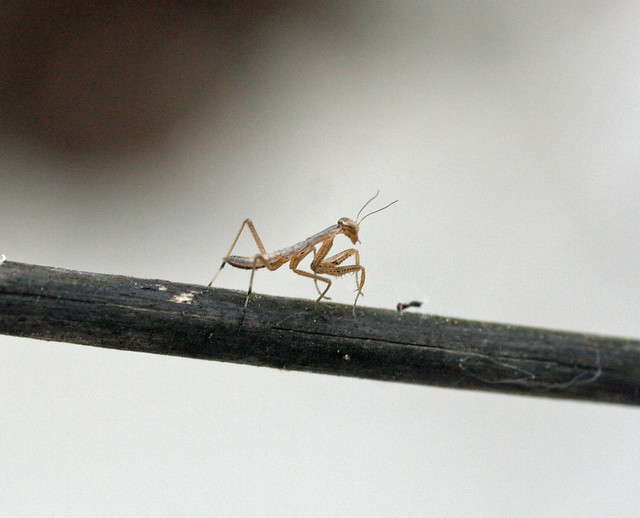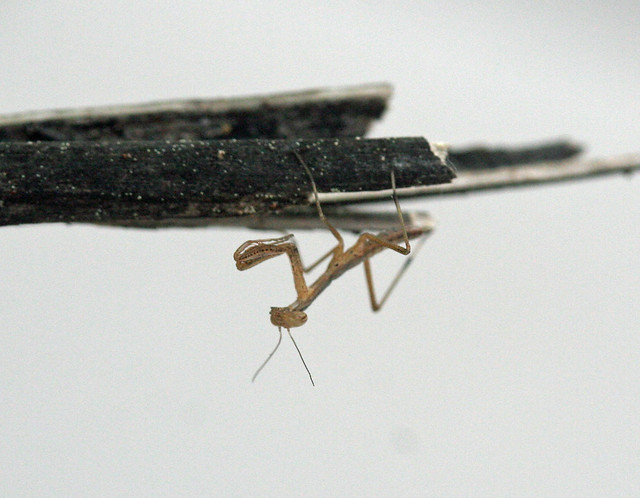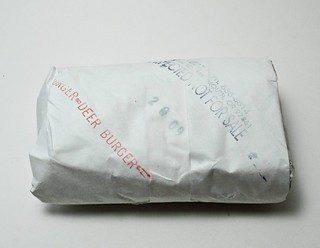Wednesday, November 18, 2015
Stand by
HOWEVER. If you like the comics and photos of this blog, check this space in late summer/autumn. I have a full camera memory card and sketch book.
See you soon!
Tuesday, October 13, 2015
Cowdogs of Eastern Oregon
This is a stark contrast to the image put forth by vocal online border collie groups who think of themselves as WORKING (in all caps) people. Their dogs are registered with some kind of working dog registry like ABCA or ISDS, and, even though these registries are technically "open", often the dogs are as inbred as the "show ring" dogs, and suffer from popular sire effects, among other problems. These people tend to idealize the trial sheep dog, while putting down dogs who work cattle, even though sheep is a dying industry and there are many more actual working cattle ranches in north America. These ranchers are sort of left in their own quiet niche, doing things the way they've been done for many years, including things like outcrossing, crossbreeding, keeping and selling pet dogs, breeding dogs that are "good enough", instead of only "best to the best"... and other "shocking" activities, virtually unacknowledged by the internet or by the registry folks.
I want to hear more from the local ranchers about their dogs. I'm starting by interviewing my friend and former coworker Jess Schiller because she has some neat dogs. Let me show you them:
(All photos copyright Jess Schiller and used with permission)
----------------------------------------
Me: Can you start by telling people a little about the ranch and your dogs?
Jess: My husband Pat's family homesteaded this area four generations ago. I'm not good on the details, but Antone Vey came over from Portugal and started raising sheep. Since then the ranch has converted to a cattle operation starting with Herefords. Pat took out his first loan for cows when he was 18 and bought 40 pair from the Spray area and now we are up to 140 mama cows mostly red angus cross. Keeping up with the red tradition in his family.
We raise calves for market and potential breeder replacements for our herd. What we are is range managers and we use our cows as the means to do so. The term "graze it don't blaze it" well that's what we try to do. We graze on private ground both on Buttercreek and in Starkey. Pat's grandmother's cows however are on private and jointly managed US Forest Service allotments.
We start calving around end of January/February and we raise the calves and maintain the mamas until we sell the calves around October. We "summer" (move to summer grazing in the mountains) May to October-ish in Starkey. Then we move them "home" to Buttercreek from October to May. The pack is used to help us gather and sort. We have at least 4000 acres here and usually it's just Pat and I so they save our horses a lot of miles here and up in the mountains.
The girls Zee and Tip, who you've met, were the best working pair we've had.
Zee is really good at going a long ways out and bringing cows up top. She was great at pushing until she got hurt. Now Pat is so scared of her getting hurt because she's his baby and bull-headed, so she doesn't get to work much. Zee has raised five litters of great working pups so she's out of practice with all of it but I have her helping me teach her son Cap who ended up being way too timid for Pat but is great for me.
Then we have Gus. He's a heeler/border collie mix. His job is a brush dog. The cows get into thick stuff, he goes in and they WILL come out.
Zip is Pat's boy and daddy to two litters out of Zee. We got him from my uncle three years ago because he had quit his job and didn't want Zip to waste away in a yard in town. It took Pat less than an hour to bond and after that Zip actually tried biting my uncle's girlfriend. He went through a grumpy strange, but not so much any more. He is such an attention whore it's ridiculous. But he is Pat's A number 1 cow dog. I'll have to send you videos it's so awesome to watch him work. So quiet and picks on the cows but if you throw a stick he's the biggest goober ever.
We have seven dogs right now, and the rest are pets. Rhett was a rescue from my cousin who realized border collies need to work. He's great with [my toddler] but not...so .. smart with cows. He's gonna get hurt with how he barrels in after cows and doesn't pay attention to what's going on. And Peter is my brother's dog. He's just special we can keep it at that.
First question(s): are any of your dogs, or any dogs in your extended family, registered with any breed registry? or have you ever entered any of your dogs in any kind of competition? (have you even heard of ABCA or ISDS?)
Negative to all. I did dog 4H once with my dad's cow dog... needless to say it didn't go well. He was getting pretty pissed with the baths for one and then the fact that I'm pretty sure he thought the show was the dumbest thing ever. Kinda like going for a pleasure ride with one of our ranch horses. They go out expecting to work.
Pat's family use to do sheep dog trials when his grandpa was alive. I'm pretty sure they had some spendy dogs from over seas. But those dogs have been gone for a long time.
Any of those trial dogs have decedents still around?
Not as far as I know. I'll ask Pat the next time I talk to him
After meeting all the different types of stock dogs around here, it seems to me that most ranchers don't care about how "pure" their dogs' bloodlines are or bother with a working registry.
I think registered dogs in the ranching world are like papered horses. It's nice and really interesting to know their background but papers don't make the animal. And you can go out and spend a lot of money on a dog to find out the mutt you raised is better than that one.
So where did all your dogs come from? Obviously in the last few years you breed your own, but further back than that?
Let's see. Tip is Pat's red dog he got from Ryan Raymond a rancher out of Pilot Rock. We are pretty sure she has a little Carter in her. Which is actually a breed of stock dog that was developed in Long Creek. We sold Pat Carter one of our pups a few years ago.
Zee my lil girl came from a couple in Heppner that we've known for a long time. They have a long line of awesome girls and I think they are looking to start training for other people.
Zip, Pat's male that we got the last two litters out of, came from a rancher out of Arlington at the time him and his ex-wife raised dogs as well.
And Gus came from a neighbor. He is the heeler cross. Cap came out of him and Zee. He's the one I've been trying to spend a lot of time with because he is pretty timid and doesn't handle Pat's aggressive tone very well but he's coming along.
Would you say that your dogs are pretty typical of other ranchers in the area? You guys aren't an outlier in how you source/use/breed?
Nope pretty typical. It's all personal preference and you know border collies they are smart and you can teach them about anything and they are one-person dogs. Makes it pretty easy to like your dogs better than the neighbors'.
I know some people go out of area to get dogs. My girlfriend Jamie is trying out a new breed called an Idaho shag, I think it's an Airedale cross. She crosses that with a heeler you'll end up with about the dumbest block head. But those cows will move!
But really if someone is looking for a good rounded dog there is no reason to go too far. There isn't a lack of border collies around here that's for sure.
Can you talk a bit more about Tip? Is she the one I met who's red with a natural bob tail? she caught my eye right away because she doesn't have a "classic" border collie look. A lot of "registry snobs" would call her a mongrel. Would you call her a "border collie"?
Lol, they'd probably think our whole pack is mongrels. Tip's a great little dog. For the longest time we argued that she was a red border collie. Kinda like how with black angus every once in awhile they have a red one. But we are starting to think she has a little Carter in her. She was the only red bob tailed in her litter and I'm pretty sure both her parents were black and white but I'd have to confirm that with Pat. She's retired with benefits now since she fell out of a truck and broke her leg and hip. By the way, I dock the tails of all our pups and we prefer dock-tailed dogs. And I know some would argue that we've killed their balance but my dad's old Ed dog (the cow dog I tried showing in 4H) had a docked tail and he kept right up with those "sheep dogs" of West's (they use to run several bands of sheep on Rhea creek). When they loaded them the dogs would run across the sheeps' backs and Ed's lack of tail didn't seem to slow him down.
I don't know much about the Carter, can you tell me a bit about that?
The Carter breed kinda died out. It's hard to find them any more. It was never wide-spread. But there were a few around. Pretty much one family started the breed. Short stalky curly breed. A few families around Heppner had some and I can't off the top of my head tell you where they came from. My father-in-law had one and he currently has a very old carter/Airedale cross. He is about one of the last ones I know of around here. Pat Carter had talked about maybe trying again. It'd be cool if he did. I have sold two pups down in the Long Creek area (90 miles south of Pendleton; Dirty rotten rough country. Hard on horses and dogs) and as far as I know they're doing great.
You may not realize this, but many of these "registry" folks I mentioned say it's not OK to crossbreed/outcross, or at least they're very afraid of it. It seems ridiculous to me. They act as if the only "good" working dogs are the ones with an inbred pedigree that goes back 40 generations.
OK my argument to that...it's just like cattle. Your cross bred cattle the calves are gonna come out stronger healthier and gain better than the pure-breds due to being heterogenous. It's been scientifically proven that cross bred animals do better. Now it's not quite the same in dogs since don't eat them in this country. But if you continue to breed the brains out of these animals all your gonna end up with is an animal that can run a course. If I'm not mistaken sheep trial courses are usually pretty similar. So all your asking that animal to do is look amazing for one small task. I'm a sucker for a cleaned up long coated border collie mostly because I know mine will never look like that! They look great and they can successfully do the exact same thing you asked them to do last weekend. Just like barrel horses it's a pattern they've done repeatedly and that's what they are gonna do.
I'm not trashing sheep dogs they are amazing to watch, but when a stock dog puts a hundred pair through a gate without a wreck and you're a half mile away on another ridge... well that's pretty amazing to watch, too.
Many anti-crossbreeding people say that they "need a dog that will do work" and they can't afford to cross (for example, like a 50/50 Airedale/border collie) because the first generation wouldn't be able to work and they'd have a whole litter of useless puppies. What do you personally do, and what do the other ranchers you know do, with dogs they breed who end up being bad workers?
I guess I've never heard that. It sounds like an old wives tale to me. I think you could end up with a whole batch of purebred that don't work, either. Honestly I have one that doesn't work very well. He is probably one of the "purest" ones I have. And I don't think it really has any thing to do with the dog. At the time I was building fence when I got him so he became more of a pack dog than a stock dog. And his personality to I don't think he has the attention span to pay attention long enough for him to actually asses the situation. Maybe if I had started him on cows first maybe it would be different. He has it. But he gets so excited he barrels in and causes a wreck and then doesn't pay attention and almost get ran over.
I think the ones that don't work it has more to do with the handlers. These people who get these dogs for pets they can't expect them to be a house dog for most of their lives and then go out and chase a cow. Yes they do have natural instinct but they still need to be taught. Pat spent a lot of time on Tip and in turn she taught Zee and now Zee is teaching Cap. Having a mature dog with pups helps soo much.
As far as what everyone else does with bad workers I'm sure you could guess what some do. But I don't think that's usually the case. I think if you spend the time with the animal and be patient you'll get a fine worker. Also border collies are famous for being timid. It took Zee three years to stop running back to the pickup when Pat was hollering at the cows. Now it just makes her go harder.
Monday, September 21, 2015
Friday, September 18, 2015
Thursday, September 17, 2015
Saturday, September 12, 2015
Sketch from yesterday
The outskirts of Pendleton, Oregon
Thursday, September 10, 2015
Quick Question
I like that animal shelters are starting to do away with breed identification of mixy mutts, calling them "All American" or something similar. Because there is no point to breed ID when the mix is too mixed.
Saturday, August 1, 2015
When Taxonomy Meets Dunning and Kruger
You've probably heard of it. It's the type of scientific finding that scientists publish widely and loudly because it's the kind of feel-good, easy-for-laymen-to-understand study about a recognizable charismatic megafauna. As they should, because it's interesting and we always need to do as much as we can to encourage the public's interest in science. Most scientists accepted it as another small building block in our understanding of the natural world, and then moved on.
"If scientists have "discovered' anything in this instance, it is simply that Jackals are every bit as diverse as we have always known, and that a few populations may be a little farther along in the speciation process than what some other scientists have previously acknowledged. A little new information, but is a debate ender? Not by a long shot."
The scientists who wrote the paper have solid, well-justified reasons to define this population as a new species, and they're laid out in detail in, y'know, the paper he's dismissing. He doesn't address a single one of their findings.
"The simple point is that your points all depend on ink from a library, while I am making a case based on real fur, feather, and fin.
You salute words, not fulling understand the fragility of those words historically or scientifically. How many genus and species have been created and merged, split and absorbed in the last 40 years? All ink and artifice as the animals themselves remain the same."
I'd like to introduce PB to the concept of "cryptic species". I know he's stuck in pre-1980's biology, but the wonder of DNA is it allows us to uncover all kinds of interesting things, like different species hiding in plain sight. Like African butterfly fish, where two species look identical despite 50 million years of separation.
Whereas TM on the other hand, seems not only confused, but bored by any evolutionary relationship that a) was discovered after about the 1970's and b) is not very clear cut. He instead simply waves away complications by saying species isn't a useful concept (well, unless he says it is). How can he be against assigning species status based on autosomal DNA, but OK with assigning it based on geography and "culture"? He offers no reasons, just keeps repeating (and has since 2005 at least, see below), "just ask the animals, they know where the species boundary is." This is weird on several levels.
He just got done telling us that "species" isn't a useful term, anyway. Which is it? Do the animals "know" what species they are, or is there no such thing as a species?
As many people have tried to point out to TM, it's a simple fact that dogs are a subspecies of wolf, whether you like it (or understand it) or not. [8]
This isn't an isolated case, either; Patrick Burns has a history of cherry picking data that fits his favorite theories, and applying purposely vague anti-science rhetoric when it doesn't.
Example 2: He thinks there are red wolves in West Virginia
2005: "The simple truth is that dogs know they are not wolves, just as wolves know they are not dogs, and humans know they are not apes." 3/11/2005 "The Wolf Within"
2015: "The real experts in these matters are not scientists, or even humans, of course, but the animals themselves. Jackals, dog, wolves, and coyotes seem to recognize major differences between themselves and give a hat tip to those differences 99.999 percent of the time." 7/31/2015
TM:
"In fact, scientists are starting to come to terms with an important idea, which is that a lot of animals are in the process of speciating ... and that the notion of species is a human idea that still needs a lot of work..."Book summary:
"...[this book] is a rich journey from Linnaeus, whose system turned classification from a hobby to a science, and Darwin, who ended the idea of rigid species definitions..."
"...the ordering and naming of life is no esoteric science. .. sorting and naming the natural world is a universal, deep-seated and fundamental human activity, one we cannot afford to lose because it is essential to understanding the living world, and our place in it."
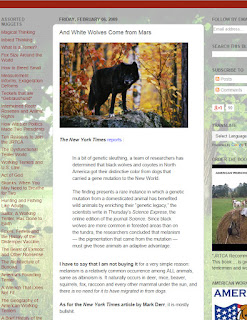
Look how he uses the same language and dismissive tone as he does every time he talks about science he doesn't like. He uses a few simple, accurate statements ("melanism is common", "dogs and wolves are related") then adds in his unjustified opinion ("therefore, the scientists can't prove the gene is from dogs"). It's like the definition of a non secitur. He seems to think that one can be correct simply if one is forceful and confident, but that's nothing but the Dunning-Kruger effect.
Notice how he also doesn't link to or critique the study itself, just the newspaper article about it, of which the most damning fact he can come up with is the author doesn't speak in absolutes.
[2] see terriermandotcom (dot) blogspot (dot) com (yes, that really is the address he chose for his blog), 7/31/2015 "First New Canine in 150 Years?"
[3] Aside from his strawmen, of course. Oh, Patty looooves his imaginary strawmen opponents
[8] Savolainen et al. 2002, Lindblad-Toh et al. 2005, Pang et al. 2009, vonHoldt et al. 2010, Larson et al. 2012, Freedman et al. 2014...
[9] as if any of those things are automatically bad, or not useful, or not interesting, or even new (from his 7/31/2015 post "First New Canine in 150 Years?")
Friday, May 22, 2015
Baby Mantis
Sunday, May 10, 2015
Help a Naturalist Stuff His Weasel
Not just any weasel; a white long-tailed weasel collected in West Virginia. There shouldn't be any white weasels in that part of the state. HOW INTERESTING you say. Sadly, it's been languishing in a freezer for over a decade. It's an interesting specimen that deserves to be professionally mounted.
Support by going to this page and pledging just $1 a month (with a special reward!)
or make a one time donation through Paypal.
Monday, April 13, 2015
Small Triumphs
This is a photo, taken today, of the first time this dog allowed me to touch him.
He's been at the shelter where I work for over a month. He has bitten nearly every staffer and several volunteers.
Today he came up and put his paws on me. I put his sweater on and a leash and took him outside. Things so minor that would have been impossible a week ago.
I'm not claiming any credit for this, except for one thing: which is I gave him his space. Except for necessary things like cleaning his kennel, and vaccinations when he first arrived, no one's done any actual "work" with him (and those who tried were the ones who pushed him too far and got bit). Slowly, through routine alone I suppose, he's come out of his snarly, terrified shell and is now going to an adoptive home.
Score for modern sheltering.
Thursday, March 12, 2015
NPR innocently asks, "does being vegan REALLY help animals?"
This article by Barbara J. King on the NPR website should have been titled "Why veganism is awesome: a vegan's perspective".
There are so many good, articulate writers and thinkers out there who are thoughtful meat eaters; the fact that this NPR writer didn't find ONE of them to talk to makes me mad. NPR is supposed to be better than this. Instead, we get yet another cookie-cutter, shallow, biased piece almost copy-pasted from the vegan movement's talking points. Although it's presented as an opinion piece, that doesn't excuse NPR for hosting such tripe.
My response, in bulleted list format because I'm lazy (also I've written about this before):
-I have friends who are vegan. They are good, earnest people who care deeply about animals, and I can dig that. Unfortunately, one of the many problems with the vegan "movement" is it is headed by radical animal rights activists just like the ones interviewed for this article. Anyone from PETA or HSUS is not "reasonable", and are complicit in the deaths of thousands of dogs and cats annually through unnecessary euthanasia. They may care for animals too, but their goal is to force their values on everyone without listening to facts or reason. They should be the last ones to use as examples if you're really trying to have a balanced discussion or convince anyone to change their lifestyle. (Also, kindly remember that us thoughtful meat-eaters care deeply for animals, too)
-Veganism (or vegitarianism, or reducing use of animal products) is not the only way, or even a good way, to go about reducing the suffering of animals by human hands.
-Just because you're not eating them, doesn't mean animals didn't die for you. Soy harvest alone kills or displaces countless birds and small mammals. Sorry to wreck your warm-and-fuzzies, but that "95" number is completely made up by someone with an agenda.
-Growing plants is not automatically better for the environment than growing animals.
-All the proven health benefits of a vegan diet have as much to do with simply being more thoughtful about diet in general than in actually being vegan.
-No, it really isn't simple or cheap to live on a vegan diet. Especially if you have children. Stop the hand-waving. Maybe we can have a discussion about how to improve public school lunches? Or reduce urban food deserts? Or incentivize community gardens? Or, you know, ANYTHING besides scolding or guilt-tripping because "I can do it, so can you"?
-While we're at it, let's acknowledge a couple things: 1) most vegans are white, middle to upper class, while most of the farmworkers who harvest the crops that make a vegan lifestyle possible are poor people of color; 2) some people really, truly can't survive on a vegan diet for health reasons; 3) food is very important to many cultures and insulting cultural dishes because they dare to contain meat is bigotry
-The word I'm looking for is 'ethnocentric'. (And also, if you're comparing yourself to Saint Paul simply because of your diet, that should be a clue that your ego is too big for you to be having a grown-up conversation, especially on freaking NPR)
-They try to imply that government or military misallocation of resources - like grains seized in Ethiopia during the height of famine- was because of factory farming? That's insane. I can't even.
-Can we PLEASE have a discussion that goes beyond "red meat"? Corn-fattened beef from feed lots is not the only animal product out there. Vegans love to hang their debate on it because it's pretty clear cut: yes, reducing this type of meat consumption is healthier; yes, feed lots are bad for the environment; yes, it's wasteful to feed them corn. We know this already. Can we talk about range cattle? Or farmed tilapia? Or backyard chickens? Or livestock fed off of marginal land unsuitable for crops? Or sustainable hunting? As someone who cares about this stuff, I hate seeing yet another black and white debate from vegans. "Beef or no meat at all" are our only choices? Really? Even the pesco-vegetarian author barely touched on how important fish is as a protein, yet dedicated many paragraphs to full-on anti-meat propaganda.
Tuesday, March 3, 2015
Agate Hunting
And every now and then, a really nice one:
This is what they look like after going through the rock tumbler:
Wednesday, February 25, 2015
Bighorn Sheep of Interstate 84
It's a special treat to see one in the wild. And if you want to see one, I can tell you exactly where to go where you're almost guaranteed to see at least a few. I've personally seen a group as large as twenty. You don't need to hike, you just need to look out your car window while driving between mileposts 128 and 115 on I-84 in Oregon.
This is the habitat:
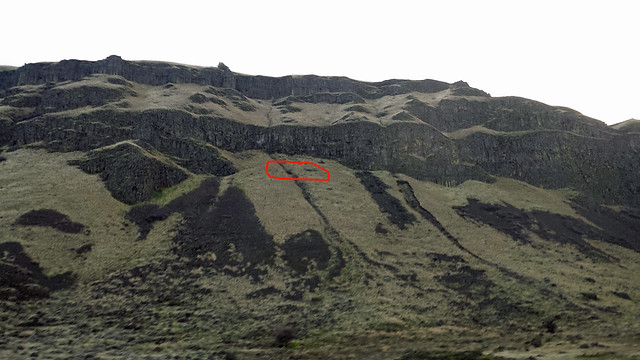
At the top of the cliffs the land flattens out a bit and is private farm land, and beyond that is the John Day River. The Oregon Department of Fish and Wildlife has been re-introducing bighorns in several places along the John Day river, but much farther south. This tiny strip of land is shown as "bighorn sheep occupied habitat" on their map, but it looks like the closest reintroduction location is many miles to the south (see below) (plus, I can't imagine ODFW thinking that land that close to a freeway would be prime habitat for reintroduction).
I'm guessing the sheep traveled to this location themselves, following the river north to the Columbia from the Cotton Canyon area. They found this small but nice piece of real-state and decided to stay, and I can see why: the steep cliffs they like to keep them safe from coyotes, plenty of water and browse, and, though they have to deal with the constant sound of traffic, they're almost guaranteed to never be harassed by hikers, hunters, dogs, or domestic livestock.
FYI: there aren't really any safe places on this stretch of road to pull over for photos. I've seen some people do it, though I haven't worked up the courage to risk death-by-semi to get some shots of the wildlife with my nice lens.












